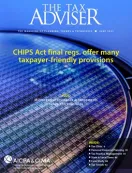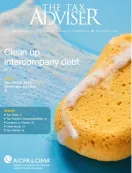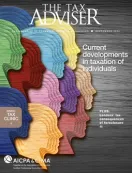- column
- DC CURRENTS
5 things to know about tax relief for federal disasters
Related
Tax Court addresses dueling motions to dismiss
Scope of review in passport cases is de novo
Practical considerations for taxpayers and advisers following Loper Bright and Corner Post
Editor: Melissa L. Wiley, J.D.
The number of taxpayers impacted by federal disasters is increasing. From 2013 to 2023, the number of areas qualifying to receive tax relief because of federal disasters increased from 141 to 750 (2013 IRS Data Book, Table 19; 2023 IRS Data Book, Table 9). In 2024, the IRS granted tax relief for federal disaster areas in approximately 40 states (IRS webpage, “Tax Relief in Disaster Situations“). To help taxpayers and tax practitioners in disaster areas, this column discusses five important considerations involving federal disasters and tax relief.
1. Once the president of the United States declares a federal disaster, the IRS has discretion to provide tax relief for numerous taxpayer deadlines.
Congress has given the IRS authority to postpone certain deadlines for taxpayers affected by a federally declared disaster, a significant fire, or a terroristic or military action (Sec. 7508A(a)). A federally declared disaster means any disaster subsequently determined by the president of the United States to warrant assistance by the federal government under the Robert T. Stafford Disaster Relief and Emergency Assistance Act (Stafford Act), P.L. 100–707 (id., Sec. 165(i)(5)(A)). A significant fire is any fire with respect to which assistance is provided under Section 420 of the Stafford Act (Sec. 7508A(e)).
Under the Internal Revenue Code, the IRS can postpone for up to one year the deadlines for certain acts by taxpayers and the government, including the following (Sec. 7508A(a)(1); Regs. Sec. 301.7508A–1(c)(1)):
- Filing any return of income, estate, gift, generation-skipping transfer (GST), employment, or most excise taxes;
- Payment of any income, estate, gift, GST, employment, or most excise taxes or any installment thereof or of any other liability to the United States in respect thereof (in regulations, the IRS excluded deposits of taxes pursuant to Sec. 6302 and its regulations);
- Filing a petition with the Tax Court or filing a notice of appeal from a decision of the Tax Court;
- Allowance of a credit or refund of any tax;
- Filing a claim for credit or refund of any tax; or
- Filing suit upon any such claim for credit or refund.
In addition to these specific items, Congress also provided a general item: The IRS can postpone any other act required or permitted under the internal revenue laws (Secs. 7508A(a)(1) and 7508(a)(1)(K); Regs. Sec. 301.7508A–1(c)(1)(vii)). Pursuant to this authority, the IRS issued Rev. Proc. 2018–58, which in Sections 5 through 17 lists other deadlines that may be postponed. Generally, the revenue procedure does not address elections, statements, or forms required to be made on, or attached to, timely tax returns because a postponement of the time for filing a tax return automatically postpones the time for making the elections and filing statements (Rev. Proc. 2018–58, §4.03).
It is critical for taxpayers and tax practitioners to remember that these deadlines are delayed only if the IRS announces relief. But once the IRS announces tax relief for a federal disaster, the following taxpayers potentially qualify for relief (Regs. Sec. 301.7508A–1(d)(1)):
- Individuals whose principal residence is located in a covered area;
- Any business entity or sole proprietor whose principal place of business is in a covered area;
- Any individual who is a relief worker affiliated with a recognized government or philanthropic organization and who is assisting in a covered area;
- Any taxpayer whose records necessary to meet a deadline for an act described in Sec. 7508(a)(1) are maintained in a covered area;
- Solely with respect to a joint return, any spouse of an affected taxpayer;
- Any individual visiting a covered area who was killed or injured as a result of the disaster; and
- Any other person the IRS determines to be affected by a federally declared disaster.
Once the IRS announces the postponement period, the affected taxpayer has until the last day of the period to perform the act. The affected taxpayer is eligible for relief from interest, penalties, additional amounts, or additions to tax during the postponement period (Regs. Sec. 301.7508A–1(b)(2)).
2. However, even if the IRS does not exercise its discretion, taxpayers get an automatic 60-day postponement anytime the president declares a federal disaster.
In 2019, Congress added a mandatory postponement of tax deadlines (§305 of the Taxpayer Certainty and Disaster Tax Relief Act of 2019, Division Q of the Further Consolidated Appropriations Act, 2020, P.L. 116–94). Under this amendment, qualified taxpayers automatically get a 60–day extension when the president declares a federal disaster (Sec. 7508A(d)). The 60–day period begins at the earliest incident date listed in the president’s federal disaster declaration (Sec. 7508A(d)(1)). The 60–day extension applies to all the tax deadlines listed in Sec. 7508(a)(1) (Sec. 7508A(d)(1)).
This mandatory relief applies to (Sec. 7508A(d)(2)):
- Individuals whose principal residence is in a disaster area;
- Any taxpayer whose principal place of business (other than the business of performing services as an employee) is in a disaster area;
- Any individual who is a relief worker affiliated with a recognized government or philanthropic organization and who is assisting in a disaster area;
- Any taxpayer whose records necessary to meet a deadline for an act described in Sec. 7508(a)(1) are maintained in a disaster area;
- Any individual visiting a disaster area who was killed or injured as a result of the disaster; and
- Solely with respect to a joint return, any spouse of an individual described in any of the above.
After Congress amended the Code to include this 60–day extension, the IRS promulgated a regulation that held that the mandatory extension applied only when the IRS exercises its authority to postpone deadlines under Sec. 7508A(a) (Regs. Sec. 301.7508A–1(g)). Recently, the Tax Court invalidated this regulation on the grounds it is contrary to the statute (Abdo, 162 T.C. No. 7 (2024); see Beavers, “Petition Timely Filed as Regulations Held Invalid,” 55 The Tax Adviser 62 (June 2024)). The Tax Court concluded that the 60–day period in Sec. 7508A(d) applies regardless of whether the IRS has executed its authority under Sec. 7508A(a). The Service did not appeal the case, and it is unknown whether the IRS would seek to challenge the ruling outside Tax Court.
3. Taxpayers located in disaster areas usually do not need to take action to receive relief.
If the IRS decides to postpone tax acts after a federal disaster is declared, it will publish the announcement in a revenue ruling, revenue procedure, notice, announcement, news release (most commonly), or other guidance (Regs. Sec. 301.7508A–1(e)). The guidance will identify affected taxpayers and describe the acts postponed, the duration of the postponement, and the location of the disaster area.Unless the guidance states otherwise, generally, all acts identified in Rev. Proc. 2018–58 are postponed. The IRS determines which acts to postpone based on the time when the disaster occurred, its severity, and other factors.
For taxpayers whose residence or principal place of business is located in the affected area, the IRS automatically identifies them and applies filing and payment relief. The Service determines which taxpayers are located in affected areas using taxpayers’ ZIP codes (another reason to update taxpayers’ addresses with the IRS). Affected taxpayers outside the covered disaster relief area who believe they qualify can call the IRS disaster hotline at 866–562–5227 to request tax relief.
4. The due dates are ‘postponed,’ not extended, which has significant procedural implications.
When the IRS grants taxpayer relief for a disaster, the Service can disregard a period of up to one year to perform a tax act, but the due date for the act does not change (Regs. Sec. 301.7508A–1(b)(4)). Thus, if another statute relies on a return’s due date, the postponement period does not change the due date of the return for purposes of that statute.
For example, when the president declared a federal disaster for COVID–19, the IRS postponed the due date for corporate and individual tax returns from April 15, 2020, to July 15, 2020 (Notice 2020–23). Generally, taxpayers must file refund claims within three years of filing the return or two years from when the tax was paid, whichever is later (Sec. 6511(a)). But in addition to this limitation on the time for filing a refund claim, the taxpayer can receive a refund only of the tax paid within the three years preceding the refund claim (if the refund claim is filed within three years of filing the return; otherwise it is two years) (Sec. 6511(b)(2)(A)). This is often referred to as the “lookback” limitation period. Any withholding or estimated tax payments are deemed made on the due date for the return (Sec. 6513(b)). Thus, in the pandemic–relief situation, if a taxpayer filed their 2019 tax return on July 15, 2020 (without filing an extension), the taxpayer had until July 15, 2023, to file a refund claim, but it was the IRS’s view that this taxpayer had to file by April 15, 2023, to get a refund of any taxes paid or deemed paid on April 15, 2020 (Notice 2023–21). The IRS granted relief for this specific situation in Notice 2023–21, but there are other similar situations where this distinction could matter.
5. Don’t forget that deadlines for the IRS may also be postponed.
When Congress gave the IRS authority to provide taxpayers relief from deadlines, it also gave the IRS the authority to grant itself relief from certain tax deadlines. Specifically, the IRS has authority to postpone time for (Secs. 7508A(a) and 7508(a)(1); Regs. Sec. 301.7508A–1(c)(2)):
- Assessing any tax;
- Giving or making any notice or demand for the payment of any tax, or with respect to any liability to the United States in respect of any tax;
- Collecting by the secretary, by levy or otherwise, of the amount of any liability in respect of any tax;
- Bringing suit by the United States, or any officer on its behalf, in respect of any liability in respect of any tax;
- Allowing a credit or refund of any tax; and
- Any other act specified in a revenue ruling, revenue procedure, notice, or other guidance published in the Internal Revenue Bulletin.
Relief hinges on awareness
When affected by a federally declared disaster, taxpayers and tax practitioners should carefully read IRS guidance on potential relief and keep these considerations in mind.
This article contains general information only and Deloitte is not, by means of this article, rendering accounting, business, financial, investment, legal, tax, or other professional advice or services. This article is not a substitute for such professional advice or services, nor should it be used as a basis for any decision or action that may affect your business. Before making any decision or taking any action that may affect your business, you should consult a qualified professional adviser. Deloitte shall not be responsible for any loss sustained by any person who relies on this article.
Contributors
Matt Cooper, J.D., isa principal in tax controversy services, and Teresa Abney, J.D., is senior tax manager, both with Deloitte Tax LLP in Washington, D.C. Melissa L. Wiley, J.D., is a partner with Kostelanetz LLP in Washington, D.C. Cooper is a member, and Wiley is chair, of the AICPA IRS Advocacy & Relations Committee. For more information about this column, contact thetaxadviser@aicpa.org.














